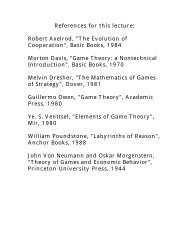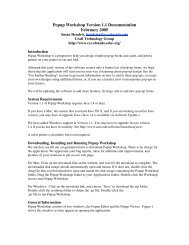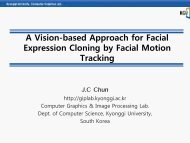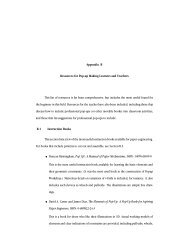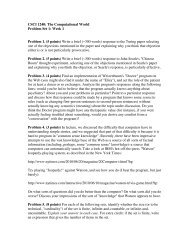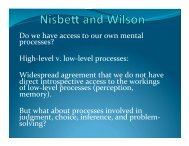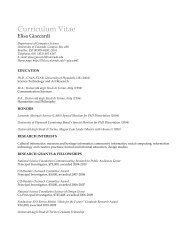A Conceptual Framework for Computer- Supported Collaborative ...
A Conceptual Framework for Computer- Supported Collaborative ...
A Conceptual Framework for Computer- Supported Collaborative ...
Create successful ePaper yourself
Turn your PDF publications into a flip-book with our unique Google optimized e-Paper software.
Innovative socio-technical environments <strong>for</strong> CSCL@Work should support the coevolution<br />
of a new understanding of (1) learning, working, and collaborating, (2)<br />
new media and new technologies, and (3) new learning organizations (see Figure<br />
1).<br />
learning, working<br />
and<br />
collaboration<br />
new media and<br />
new technologies<br />
new learning<br />
organizations<br />
Figure 1: The Integration and Co-Evolution between Activities, Organizations, and Media<br />
An example of gift-wrapping would be the use of students response systems (such<br />
as Clickers) to enhance classroom learning by supporting students to provide<br />
feedback and allowing teachers to get a quick assessment of the students’<br />
understanding. An example of technology-driven developments would be an<br />
objective such as “all schools on the Internet” (as promoted by Al Gore around<br />
1994) which is necessary to explore different learning opportunities but not<br />
sufficient (without accompanied changes in content and pedagogy) to improve<br />
learning.<br />
Research Questions (RQs). The preceding argumentation provides the foundation<br />
<strong>for</strong> research questions (RQs) that I have first articulated in my presentation at the<br />
workshop “CSCL at Work” at the GROUP’2010 conference) [Fischer, 2010]:<br />
� RQ-1: Does distributed cognition provide an interesting perspective <strong>for</strong><br />
CSCL@Work?<br />
� RQ-2: Does the integration of problem framing and problem solving allow<br />
stakeholders to cope with poorly understood and ill-defined problems?<br />
� RQ-3: Will communities of interests be more successful in coping with<br />
systemic problems than communities of practice?<br />
� RQ-4: How do we create frameworks, media, and organization to learn from<br />
each other when the answer is not known?<br />
These research questions will be illustrated with two narratives and with<br />
developments of components of our conceptual framework in the following<br />
sections.<br />
Gerhard Fischer 5 Contribution to Book “CSCL at Work”




